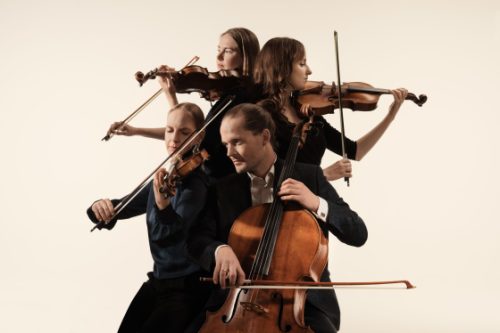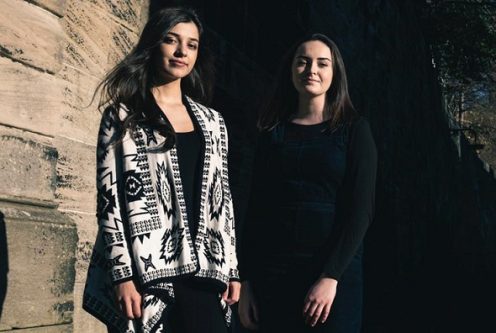
Music at Paxton – Summer Festival of Chamber Music 2023 (MC)
Music at Paxton 2023 is held at Paxton House in the county of Berwickshire, part of the Scottish Borders region. This is my fifth occasion attending Music at Paxton, a ten-day festival that is taking place between the dates Friday 21st July to Sunday 30th July 2023.
Set in the spectacular rolling scenery of the Scottish Borders, Paxton House is only a short walk to the River Tweed, and some five miles from the Northumberland town of Berwick-upon-Tweed. Most of the concerts are held in the beautiful Picture Gallery of this historic Georgian house that makes an elegant backdrop, while some other concerts use a large marquee in the substantial grounds of the estate.
Festival artistic director Angus Smith and his Music at Paxton team have put together a varied and thoughtful music programme, gathering a talented group of musicians. Consisting of seventeen events including those appealing to the seasoned chamber music follower, to concerts for all the family to enjoy, and to those especially designed for young children.
My stay was for the first three days of Music at Paxton, and I selected four concerts to review.
Music at Paxton – Summer Festival of Chamber Music 2023 [1]:
21.7.2023 – Dudok Quartet Amsterdam (Judith van Driel, Marleen Wester [violins], Marie-Louise de Jong [viola], David Faber [cello]), Picture Gallery, Paxton House

Pérotin – Viderunt Omnes (c. late twelfth century)
Guillaume de Machaut – Kyrie from Messe de Nostre Dame (1365)
Carlo Gesualdo – Deh, come invan sospiro from Sesto Libro di Madrigali (1611)
(All three works arranged for string quartet by the Dudok Quartet)
Mozart – String Quartet No.23 in F major, K.590 (1790)
Tchaikovsky – Lensky’s aria from Eugene Onegin (1879); String Quartet No.3 in E-flat minor, Op.30 (1876)
Opening the concert was the Dudok Quartet Amsterdam who thankfully had stepped in at short notice to replace the original string quartet who withdrew from the festival over travel issues.
This was my first concert by the prize-winning Dudok Quartet, founded in 2009 and studied with the Alban Berg Quartet at the Cologne University of Music with further study with Marc Danel (founder of the renowned Danel Quartet) at the Dutch String Quartet Academy.
Not content with only playing the standard works of the string quartet repertory, the Dudok look for something different in its programmes. Increasingly chamber players are electing to stand when playing and this was an approach the two violins and viola adopted. Commencing the recital, the Dudok chose to play its own arrangements drawn from three choral works from early music composers Pérotin and Guillaume de Machaut from the Medieval era, and also Renaissance composer Carlo Gesualdo. Taking around one to three minutes each, these early music arrangements make fascinating listening with the tuning of Machaut’s Kyrie producing a curious dissonance. So, full credit to the Dudok for preparing these miniature arrangements that I notice are contained on its album What Remains (2023) issued on the Rubicon label.
Next the Dudok took the audience to more familiar territory with Mozart’s String Quartet No.23 in F major, K.590 that is the third of the three co-called Prussian Quartets (K. 575, 589 & 590) written in 1789-90 and the last quartet he wrote. It seems Mozart dedicated this set of three quartets to King Friedrich Wilhelm II of Prussia who was an amateur cellist. In the F major score, the style of his older Austrian compatriot Haydn is never too far away. This was a standout performance from the Dudok who clearly relished the combination of solo display and ensemble that Mozart’s writing required. Marked Allegro moderato the Dudok provided a distinct singing quality to the opening movement and the theme and set of variations in the Allegretto was quite gloriously played. There was noticeably spirited and ebullient playing of the Menuetto: Allegretto by the Dudok and the Allegro: Finale movement, full of twists and turns, was afforded such a strong character.
After the interval the Dudok announced it was playing an extra piece an arrangement of Lensky’s celebrated aria from Tchaikovsky’s opera Eugene Onegin. This is where the young poet Lensky awaits his duel with aristocrat Onegin, and looks back over his life, his love for Olga and how he fears dying. The lovely main theme and the pizzicato played on cello were my highlights.
Next, the Dudok played Tchaikovsky’s String Quartet No.3 in E-flat minor, Op.30, a work begun in Paris and completed at Moscow in 1876. The previous year Tchaikovsky’s friend, Ferdinand Laub who was leader in the premieres of his first two string quartets, had died unexpectedly and the score is dedicated to his memory. In the opening movement marked Andante sostenuto – Allegro moderato the contrasting emotional energy was given liberally by the Dudok together with agitated and furious waves of sound in the Allegro moderato section. In the hands of the Dudok the light-hearted Scherzo was given a smart and impish character. Written to commemorate the loss of Laub the Andante funebre e doloroso, ma con moto has a deeply emotional quality. Not as slow as I wanted the Dudok’s playing did not quite capture the intense pain of death. There is a distinct folk feel to the Finale: Allegro non troppo e risoluto that came across as a lively celebration of rustic dance and drinking. Here I must single out the playing of Judith van Driel for her sterling leadership, and top-drawer playing with a beautiful tone from her violin, a Francesco Goffriller (1725).
For its encore the Dudok Quartet Amsterdam played a very brief arrangement of a Shostakovich piano prelude. I doubt anyone would leave this recital without feeling uplifted and I for one was engrossed by the sincerity and firm resolve of the quartet’s performances.
Music at Paxton – Summer Festival of Chamber Music 2023 [2]
22.7.2023 – Sophie Joint (keyboard) and Breanna Wilson (fiddle), Marquee, Paxton House, Berwickshire, Scotland

Owing to the withdrawal of the original artists, Sophie Joint on keyboard and fiddle player Breanna Wilson had generously stepped in to perform the morning Family Concert. Six hours later the duo of Sophie and Breanna returned to the large marquee in the Paxton grounds for their concert, a mix of modern and traditional styles embedded in the folk music of Scotland and Ireland. Glaswegian Breanna began playing the fiddle in the Irish music tradition whilst at junior school.
Breanna also composes and states she finds her inspiration ‘from travelling and seeing different places and meeting new people. I feel most inspired and creative when I’m exploring new things.’ Keyboard player Sophie is also from Glasgow and her involvement with traditional Scottish music began with the Juniors scheme at the Royal Conservatoire of Scotland (RCS Juniors). Sophie has highlighted her experience of performing in 2019 at the Celtic Colours Festival, Canada.
Both musicians met whilst students at the Royal Conservatoire of Scotland, Glasgow and have been performing together for five years. Breanna and Sophie’s prizewinning includes The Molloy Award for traditional Irish musicians at Birmingham TradFest 2019. Individually the players were both finalists in the BBC Radio Scotland Young Traditional Musician 2022 held at Celtic Connections Festival, Glasgow and are now part of Live Music Now Scotland which gives young artists opportunities to perform.
I do not have the opportunity to hear traditional Scottish and Irish music as often as I would like so this was a folk concert that I was especially looking forward to. With their warm and welcoming stage presence Breanna and Sophie immediately set the atmosphere for the concert with their mix of traditional Scottish and Irish music folk together with their own compositions, eight from Breanna and one by Sophie. The format used by the duo for their programme was to play ten separate sets usually comprising three pieces of music that segued together. Undemanding in character, the music felt sincere and uplifting and just flowed along beautifully. There was nothing necessitating driving rhythms, it was not that type of concert. Breanna and Sophie’s focus was on playing feel-good pieces with sparkling melodies on their fiddle and keyboard together with simple foot-tapping. In truth, this was a concert that I did not want to end. So praise where praise is due to Breanna and Sophie who certainly captured the joyful essence of traditional Scottish and Irish music.
Michael Cookson
Programme (name of piece with composer):
1) Bertie’s Jig – Breanna Wilson
2) Odd Socks /Sharig / The Road to Moira – Amy Thatcher / Brian Finnegan / Sophie Joint
3) Fridays in Morningside / Jig for Yvette / Anne Lacey’s – Breanna Wilson / Bríd Harper / Liz Carroll
4) Paddy Fahey’s / Foxhunter’s / Untitled – Paddy Fahey / Traditional / Breanna Wilson
5) The Road to Lisdoonvarna / Merry Kissed the Quaker – Traditional
6) Sophie’s / The Mother’s Delight / The Ladybird – Breanna Wilson / Traditional / Breanna Wilson
7) Moonlight / Tension on the Shore – Breanna Wilson / Michael Rooney8) Annaëlle’s / 40 Degrees – Breanna Wilson
9) The Crock of Gold / The Merry Blacksmith / Siobhan O’Donnell’s – Traditional Irish
10) The Sgitheanach’s / Compliments to Eilidh Smith / President Garfield – Malachy Arnold / Ali Levack / Traditional
